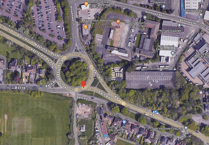A couple who recently moved to Holcombe are this week warning others to be careful of unlicensed doorstep traders after handing over £100 in cash to have their rubbish removed – only to discover it dumped in a lane along the road from their home.
Craig and Becky Hanley were approached by a man who knocked on their door and asked if they would be happy to pay for the rubbish, which consisted of boxes and packaging, as well as personal items, from their move, to be taken away. The couple, who both have health problems, thought it would be a good opportunity for someone to lend a hand.
“There were bits of foam, a television box and bags with bits in that we had decided we didn’t need,” explains Craig, who has 21 fractures in his spine. “A man who had a red transit van knocked on the door and offered to take away the rubbish for a price – and agreed to come back. He did, as promised, took one load, and then returned for the rest.
“A few days later, we decided to go for a drive to Shepton Mallet, but had to take a detour through the lanes. We were only saying how the rubbish in the lanes was getting worse and it was more noticeable once the hedges were being cut back – and then I saw some black bags that looked like ours.
“Obviously you think it can’t be yours, but it was playing on my mind. We went back to look at it and found an envelope with our address on.
“We then had to try and load it all back into the car, which was really difficult for us both. It’s worrying because it was obvious it was our rubbish, and we didn’t even know it had been dumped there. It was easily traceable back to us. It’s not a nice feeling to think that you have been targeted and it makes you feel suspicious of others in future.”
The couple called Rob Bradfield, a licensed local waste remover from Clandown and advertiser in The Journal, who says the problem is getting worse. “Many people feel that it is getting harder to dispose of their rubbish – opening hours have been reduced for local recycling and refuse centres, and when you do go, there are strict rules and often many questions, which can make people feel uncomfortable, when they have nothing to be uncomfortable about. You also have to be registered at your local centre, which has meant some people just haven’t bothered.
“Readers wanting waste removed should always ask to see a licence from the Environment Agency. I have public liability insurance and keep receipts from the tips, paying by kilo. It is becoming more and more expensive for us to dispose of waste – for example, a fridge/freezer disposal will now cost me around £40, and if someone around the corner offers to get rid of it for £20, I’d be very wary – it’s more than likely going to end up in a hedge.”
A recent report by the BBC has found that Councils in England and Wales spend more than £50 million a year annually on clearing up fly tipped rubbish, with more than 900,000 reports received every year.
A spokesperson for Bath and North East Somerset Council said this week: “The Council has a dedicated response team to deal with larger fly tips, with the wider cleansing team clearing small fly tips during the course of their daily work. We usually clear within 48 hours, unless there’s a need for specialist equipment.
“We haven’t noticed a particular increase in numbers being reported. The recycling centres are open seven days per week for householders to bring their rubbish, but are not for tradespeople or waste that has been generated through the course of a business, as there are specialist commercial sites for this.
“If you employ a tradesperson to do a job for you, you have a legal duty to find out where they are disposing your waste. Both you and the tradesperson can be prosecuted under Duty of Care legislation if your waste is found dumped in an unauthorised location.”
B&NES Council asks any residents to report fly tipping by emailing: [email protected] or by calling: 01225 394041. However, if rubbish is dumped on private land, the local authority maintains that it is the responsibility of the landowner to clear it. Anyone caught fly tipping could be prosecuted with heavy fines and a potential prison sentence. If asbestos or chemicals have been dumped, it is important to report the site to the Environment Agency. Anyone who witnesses fly tipping should try to take the details of the vehicle and registration number, a description of the person, any photographic evidence and note the date, time and location.
“I feel really upset that we were caught out,” adds Craig, “but if just one person learns from our story, then hopefully they will be saved the upset. Always check the waste carrier’s registration, because it could be you that is accountable otherwise.”




